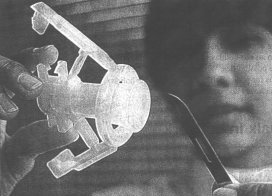Male circumcision used to be routine, but not anymore. Erin Kennedy reports.
There has since been a move away from automatic circumcision, but one-sixth of the world's males still have their foreskins partly or completely amputated. Most are circumcised for religious or cultural reasons, and, till recently, many New Zealanders had their sons snipped merely to match their fathers. The British, American and Australian Medical Associations all take a similar line these days - that the operation is unnecessary and should be performed only for medical reasons. The New Zealand Medical Association has yet to formulate a policy.
While between 80 and 90 per cent of American newborn males are circumcised, the figure is 15 per cent in Australia, and in New Zealand the rate is about 5 per cent, mostly for cultural or religious reasons. The ritual has a deep significance for Jews, who believe it was a covenant between God and Abraham to circumcise on the eighth day after birth. The Talmud states. though, that ''the third child was excused from circumcision if the first two had died as a result of the circumcision". In the Victorian era, doctors theorised that circumcision would discourage boys from masturbating, and during World War II, it gained popularity as a means of preventing infection. Spencer Beasley, of the Christchurch School of Medicine. who is also president of the Society of Paediatric Surgeons, says some obstetricians still perform the operation at birth, but most surgeons will not do it before the baby is six months old. "We no longer believe that newborns don't feel pain, so they are given a general and local anaesthetic." The operation is also safer later on, as the risk of infection is higher in newborns whose immune systems are immature. Professor Beasley estimates that about 1000 circumcisions are done in New Zealand every year for medical. reasons. Some Pacific Islands groups have their boys circumcised between the ages of six and 10, and they tolerate the procedure "surprisingly well", with most saying they will have their own sons circumcised. "Very few are unhappy about being circumcised, though many will acknowledge that they have been given no choice," he says. Where a boy clearly does not want the operation a surgeon will not proceed till agreement has been reached. "We believe the children have rights, too," Professor Beasley says. The society's guidelines on circumcision say that, despite the strong beliefs of some ethnic and religious groups, it would still discourage circumcision unless medically indicated. "In due course, with the multicultural nature of our society, blending of ethnic groups and with ongoing education. it would be hoped that there would be a decline in the number of routine circumcisions performed. "Ethnic groups who perform circumcision in late childhood may choose to allow their children to decide whether they wish to proceed with circumcision or reject the operation and retain their prepuce." In a recent article in Australia's Journal of Law and Medicine, Bond University's Gregory Boyle and three lawyers denounce male circumcision as "assault causing grievous bodily harm". They argue that laws against female genital mutilation that do not also prohibit male genital mutilation contravene principles of equal protection enshrined in the law. They also argue that circumcision removes 50 per cent of penile skin. making achieving orgasm difficult, and that it is dangerous. A West Australian man last year won A$360,000 (NZ$440,000) for a routine neo-natal circumcision that caused physical and sexual harm. THOUGH doctors generally oppose circumcision, they acknowledge that in some cases it is medically based, for example, where boys get infections because the foreskin is too tight. Though the Medical Association may not have a definite view, the Health Funding Authority does. The operation is only performed in New Zealand through the public health system for medical reasons. Otherwise, parents must pay between $800 and $2000 for private operations. The American Academy of Paediatrics says that. though it may have some potential health benefits, circumcision is not essential to a child's wellbeing. The academy encourages parents to discuss the pros and cons of the operation with their doctor and "make an informed decision about what is best interest of their child". On the pro side are doctors who believe circumcision can prevent urinary tract infections, cancer of the penis and some sexually transmitted disease. Professor Beasley, though, says recent studies have suggested that circumcision does not lessen those risks. "It is really not resolved. In New Zealand, we tend to take a conservative, middle-of-the-road approach. We are not strongly against it and we are not strongly for it." The society notes. too, that personal sexual behaviour patterns will determine whether sexually transmitted infections are transmitted, and says circumcision is not justified in order to protect males from contracting diseases that can still be acquired through ignoring precautions later in life. Lynne Robertson-Neupane, from Wellington, is expecting her second child in June and says there is no way she would have a son circurmcised. She has researched the issue and was struck by the stories of some men circumcised as babies who now deeply resent it. "It seems a brutal and unnecessary procedure to me, though I can understand people doing it for religious reasons," she says. "I don't believe in doing something that could affect someone's sexuality later on without their permission." |
